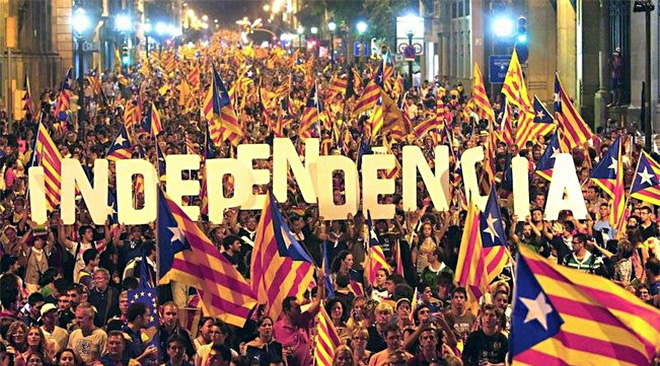Jordi Salvador i Duch is a deputy for the Republican Left of Catalonia in the Spanish Congress.
He speaks to EA Worldview’s Digital Media Editor, Ellis Palmer Babe, as part of our ongoing series on the situation in Catalonia.
Tell us a little bit about yourself.
I’m a social and cultural antropologist, a trade unionist, and, presently, I’m a deputy (MP) for the Republican Left of Catalonia (ERC) for the province of Tarragona in the Spanish Congress of Deputies.
Prior to becoming an MP, I was a professor of Social and Cultural Anthropology at the Rovira i Virgili University in Tarragona as well as the General Secretary of the General Workers Union (UGT) in Tarragona. In 2007, I published an anthropological study of FC Barcelona, “Football as a Metaphor of a Cold War”, looking at FC Barcelona as a social phenomenon and how the authorities have responded to it.
How did you come to be a deputy for ERC?
It was actually the ERC who approached me to stand as an MP. In recent years, the Republican Left of Catalonia has developed a strategy of opening itself up to people within the wider leftist independence movement who would not normally stand for election. They made me an offer, we agreed on the project, and I agreed to use my experience as a union leader and anthropologist in an area where I can make a real difference to the lives of working-class Catalans. I must say that I have always been an independentist, whilst also being an internationalist.
The Republican Left of Catalonia is a leftist independentist movement, so why do they sit in the Spanish Parliament when they want to break away from Spain?
Yes, there are several reasons why the Republican Left of Catalonia sits in the Spanish Parliament.
Firstly, it is important not to allow the anti-independentist parties, such as Citizens, the PP and the PSOE, to dominate the discourse about Catalonia and its territorial situation. Madrid is an important international base for the media and there is a need to be there to disseminate our message to the wider world.
Secondly, because whilst we build the Catalan Republic, the needs of the people who live in Catalonia have to come first, so wherever there is power and the decisions made by this power affects our people, the Republican Left of Catalonia has to be there: that’s why we are in Brussels and Madrid as well as across Catalonia.
When people wake up, they often have priorities other than independence like buying clothes for their children or finding work. To win popular support for independence, we have to represent people on the issues that they care about.
Finally, we sit in the Spanish Parliament as it allows us to establish alliances with other left-wing groups in Spain and its nations. We are not communist Albania nor do want to be: it is in our DNA to always stand in solidarity with other stateless nations and with the problems of the working classes around the country and the world.
Obviously, the Republican Left of Catalonia is in favor of independence, but how do you intend to achieve it?
We are democrats and we are peaceful. We started this process towards the construction of the Catalan Republic on the street and we want it to end via the ballot box. If it is possible to agree a solution, that would be the best choice, but if not, we will have to hold a unilateral referendum or declare independence through some other means. There’s no other alternative.
Tell us about your experience of the Diada (Catalan National Day) this year.
The day of this year is the continuation of a collective enthusiasm that stems from afar, not just from the big events of [past years], but from Catalonia’s collective history, from our imagination that comes from far back in time, long before the Spanish Constitution as some wish to ignorantly assume.
This collective enthusiasm exists as people want to create a socially just, independent republic. We owe it to our history, we owe it to the generations of Catalans that made many sacrifices and lost their lives chasing this dream: we are playing a game that we have a real chance of winning this time.
What do you think will happen with the Catalan and Spanish situations in the coming months?
Well, unfortunately, Spain is a state where the power of the majority party is residual. Consider having a single mayor in a town of 500 people where people have a complex history with their neighbors, it will not be easy: there will be battles over legitimacy and petty power struggles between different factions. That can only be stopped by giving a political solution to a historical political problem: Catalans need the right to decide on their future.
If Spain does not see what is best for them and for us through the negotiation of a referendum – and if it is won, the negotiation of separation — things could become rather ugly.
The role of the EU [European Union] as a mediator may perhaps be essential, but it is difficult to see this occuring the reactionary nature of the EU in the last 15 years or so.
It is worth noting that the PP is a political party that has its roots in the elites of the Franco era, together with most reactionary elements of Spanish nationalism and authoritarian tendencies.
This could lead to a confrontation that, for our part, will be done changing by the legal status of Catalan law, so it is sovereign and through the power of democracy, peaceful protest, and disobedience as our only weapons.

